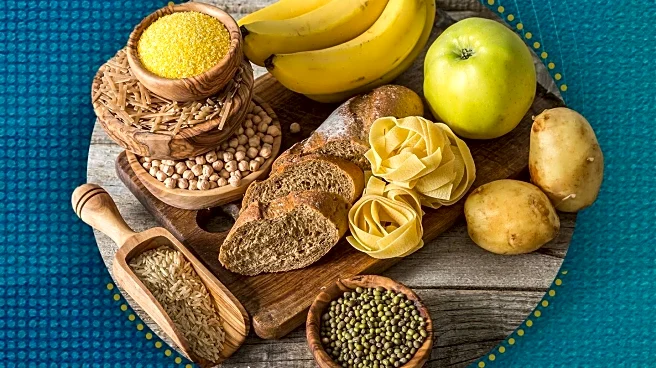What is the story about?
What's Happening?
A new wellness trend known as 'fibermaxxing' is gaining traction on social media, encouraging individuals to increase their daily fiber intake. Registered dietitians emphasize the importance of fiber in the diet, noting that approximately 95% of U.S. adults and children do not consume enough fiber. The trend promotes the consumption of fiber-rich foods such as flaxseeds, beans, nuts, and fruits to improve digestive health, promote fullness, and aid in weight loss. Meal delivery services like Purple Carrot have responded by offering high-fiber meal plans. Experts caution that while increasing fiber intake is beneficial, it should be done gradually to avoid gastrointestinal discomfort.
Why It's Important?
The fibermaxxing trend highlights a significant gap in the American diet, where fiber intake is often insufficient. Increasing fiber consumption can have numerous health benefits, including improved gut health, lower cholesterol levels, better blood sugar management, and reduced risk of chronic diseases such as colorectal cancer, Type 2 diabetes, and cardiovascular disease. This trend could lead to a shift in dietary habits, encouraging more Americans to incorporate fiber-rich foods into their meals, potentially improving public health outcomes and reducing healthcare costs associated with diet-related illnesses.
What's Next?
As the fibermaxxing trend continues to grow, it is likely that more meal delivery services and food companies will introduce high-fiber options to meet consumer demand. Dietitians may also increase efforts to educate the public on the benefits of fiber and how to incorporate it into their diets effectively. Additionally, there may be increased research into the long-term health impacts of fibermaxxing, particularly for individuals with specific health conditions who need to manage their fiber intake carefully.
Beyond the Headlines
The fibermaxxing trend also raises questions about the broader implications of social media-driven health trends. While these trends can promote positive dietary changes, they may also lead to misinformation or unhealthy practices if not guided by professional advice. The role of dietitians and healthcare professionals in providing accurate information and guidance becomes crucial in ensuring that such trends contribute positively to public health.
















